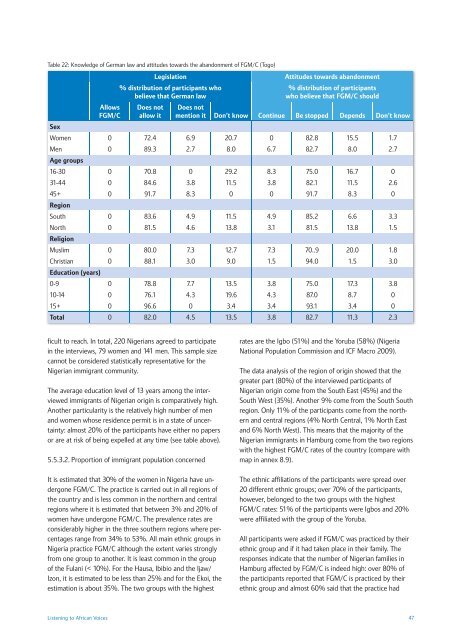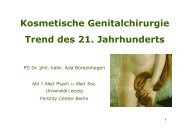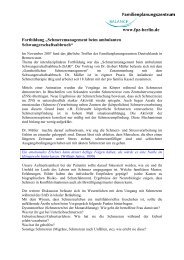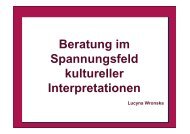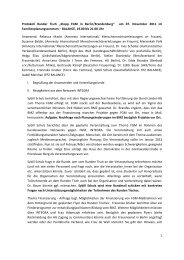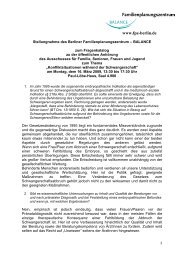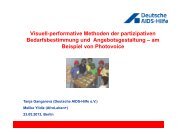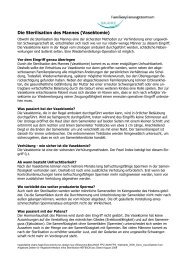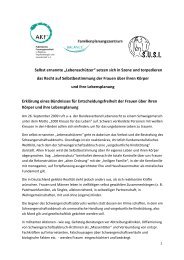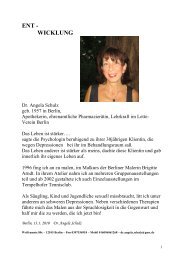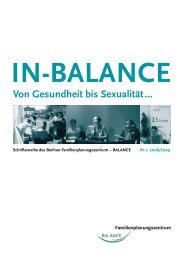Listening to African Voices - FPZ
Listening to African Voices - FPZ
Listening to African Voices - FPZ
Create successful ePaper yourself
Turn your PDF publications into a flip-book with our unique Google optimized e-Paper software.
Table 22: Knowledge of German law and attitudes <strong>to</strong>wards the abandonment of FGM/C (Togo)AllowsFGM/CLegislation% distribution of participants whobelieve that German lawDoes notallow itAttitudes <strong>to</strong>wards abandonment% distribution of participantswho believe that FGM/C shouldDoes notmention it Don’t know Continue Be s<strong>to</strong>pped Depends Don’t knowSexWomen 0 72.4 6.9 20.7 0 82.8 15.5 1.7Men 0 89.3 2.7 8.0 6.7 82.7 8.0 2.7Age groups16-30 0 70.8 0 29.2 8.3 75.0 16.7 031-44 0 84.6 3.8 11.5 3.8 82.1 11.5 2.645+ 0 91.7 8.3 0 0 91.7 8.3 0RegionSouth 0 83.6 4.9 11.5 4.9 85.2 6.6 3.3North 0 81.5 4.6 13.8 3.1 81.5 13.8 1.5ReligionMuslim 0 80.0 7.3 12.7 7.3 70..9 20.0 1.8Christian 0 88.1 3.0 9.0 1.5 94.0 1.5 3.0Education (years)0-9 0 78.8 7.7 13.5 3.8 75.0 17.3 3.810-14 0 76.1 4.3 19.6 4.3 87.0 8.7 015+ 0 96.6 0 3.4 3.4 93.1 3.4 0Total 0 82.0 4.5 13.5 3.8 82.7 11.3 2.3ficult <strong>to</strong> reach. In <strong>to</strong>tal, 220 Nigerians agreed <strong>to</strong> participatein the interviews, 79 women and 141 men. This sample sizecannot be considered statistically representative for theNigerian immigrant community.The average education level of 13 years among the interviewedimmigrants of Nigerian origin is comparatively high.Another particularity is the relatively high number of menand women whose residence permit is in a state of uncertainty:almost 20% of the participants have either no papersor are at risk of being expelled at any time (see table above).5.5.3.2. Proportion of immigrant population concernedIt is estimated that 30% of the women in Nigeria have undergoneFGM/C. The practice is carried out in all regions ofthe country and is less common in the northern and centralregions where it is estimated that between 3% and 20% ofwomen have undergone FGM/C. The prevalence rates areconsiderably higher in the three southern regions where percentagesrange from 34% <strong>to</strong> 53%. All main ethnic groups inNigeria practice FGM/C although the extent varies stronglyfrom one group <strong>to</strong> another. It is least common in the groupof the Fulani (< 10%). For the Hausa, Ibibio and the Ijaw/Izon, it is estimated <strong>to</strong> be less than 25% and for the Ekoi, theestimation is about 35%. The two groups with the highestrates are the Igbo (51%) and the Yoruba (58%) (NigeriaNational Population Commission and ICF Macro 2009).The data analysis of the region of origin showed that thegreater part (80%) of the interviewed participants ofNigerian origin come from the South East (45%) and theSouth West (35%). Another 9% come from the South Southregion. Only 11% of the participants come from the northernand central regions (4% North Central, 1% North Eastand 6% North West). This means that the majority of theNigerian immigrants in Hamburg come from the two regionswith the highest FGM/C rates of the country (compare withmap in annex 8.9).The ethnic affiliations of the participants were spread over20 different ethnic groups; over 70% of the participants,however, belonged <strong>to</strong> the two groups with the highestFGM/C rates: 51% of the participants were Igbos and 20%were affiliated with the group of the Yoruba.All participants were asked if FGM/C was practiced by theirethnic group and if it had taken place in their family. Theresponses indicate that the number of Nigerian families inHamburg affected by FGM/C is indeed high: over 80% ofthe participants reported that FGM/C is practiced by theirethnic group and almost 60% said that the practice had<strong>Listening</strong> <strong>to</strong> <strong>African</strong> <strong>Voices</strong> 47


